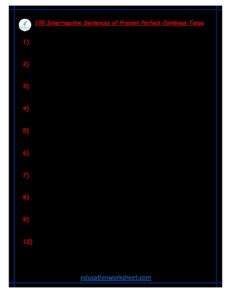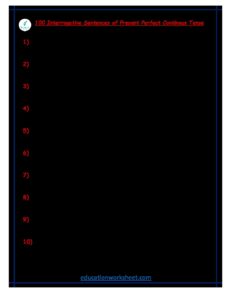Present Perfect Continuous Tense interrogative examples worksheets
Present Perfect Continuous Tense interrogative examples
The Present Perfect Continuous tense is a unique and versatile grammatical construct in the English language. It is used to describe actions or situations that began in the past, continue into the present, and are likely to continue into the future. In interrogative sentences, this tense is employed to ask questions about these ongoing actions or situations. In this comprehensive exploration, we will delve into the intricacies of the Present Perfect Continuous tense, provide numerous interrogative examples, and highlight its various uses and nuances.
What is the Present Perfect Continuous Tense?

The Present Perfect Continuous tense is formed by combining the present tense of the auxiliary verb “have” (have/has), the past participle of the verb “be” (been), and the base form of the main verb with the -ing suffix (present participle). This combination results in sentences that inquire about actions or situations that have been taking place from a point in the past up to the present moment and may continue into the future.
The formula for constructing interrogative sentences in the Present Perfect Continuous tense is as follows:
Have/Has + Subject + Been + Verb + -ing + …?
Now, let’s explore various examples to better understand the usage of interrogative sentences in the Present Perfect Continuous tense.
1. General Ongoing Actions:
a. Have you been studying English for long? b. Has she been working at the company since last year? c. Have they been living in this neighborhood for a decade?
In these examples, we are asking about activities that have been occurring continuously for a certain period leading up to the present moment.
2. Recent Activities:
a. Have you been feeling unwell lately? b. Has he been complaining about the noise all morning? c. Have they been arguing again?
These questions inquire about actions that have taken place recently and may still be ongoing.
3. Temporary Situations:
a. Has she been staying with you for a while? b. Have they been renting a house in the city? c. Have you been working here during the summer?
These interrogative sentences focus on temporary situations or arrangements that have persisted up to the present time.
4. Actions with Present Relevance:
a. Have you been exercising regularly? b. Has he been practicing the piano today? c. Have they been using your computer without permission?
These questions inquire about actions or behaviors that have current relevance or impact on the present.
5. Actions with Future Implications:
a. Have you been saving money for a special occasion? b. Has she been preparing for her upcoming exams? c. Have they been planning a surprise party for their friend?
In these examples, we ask about actions or preparations that started in the past and are likely to continue into the future.
6. Annoyance or Complaints:
a. Have you been playing loud music all night? b. Has he been talking on the phone during our meeting? c. Have they been making a mess in the kitchen?
These questions express annoyance or complaints about ongoing actions that may be bothering the speaker.
7. Checking Information:
a. Have you been hearing rumors about the project? b. Has she been receiving my emails? c. Have they been watching the news lately?
In these cases, interrogative sentences are used to inquire whether the speaker has heard or received specific information.
Present Perfect Continuous Tense interrogative examples worksheets

8. Confirming Plans or Arrangements:
a. Have you been booking the tickets for our trip? b. Has he been reserving a table for dinner tonight? c. Have they been confirming the details of the event?
These questions seek confirmation about actions related to future plans or arrangements.
9. Expressing Concern or Care:
a. Have you been feeling better after your illness? b. Has she been taking her medication regularly? c. Have they been getting enough rest recently?
In these examples, interrogative sentences are used to express concern or care for the well-being of the subject.
10. Hobbies and Interests:
a. Have you been gardening in your free time? b. Has he been reading science fiction novels lately? c. Have they been exploring new cuisines together?
These questions inquire about the subjects’ hobbies and interests, highlighting their ongoing engagement in these activities.
11. Emotional States:
a. Have you been feeling happy these days? b. Has she been experiencing stress at work? c. Have they been enjoying their vacation?
These questions aim to understand the emotional states or moods of the subjects.
12. Weather and Environmental Conditions:
a. Has it been raining a lot in your area? b. Have they been experiencing extreme temperatures this summer? c. Has the pollution level been high in the city recently?
These questions relate to weather conditions or environmental factors that have been ongoing.
13. Assessing Progress:
a. Have you been making progress in your language learning? b. Has he been improving his writing skills? c. Have they been achieving their fitness goals?
These interrogative sentences are used to assess the progress or development of the subjects in a particular area.
14. Tracking Performance or Actions:
a. Have you been meeting your sales targets this quarter? b. Has she been attending her dance classes regularly? c. Have they been completing their assignments on time?
These questions are used to track performance or actions in a professional or educational context.
15. Reflecting on Past Actions:
a. Have you been making the same mistakes repeatedly? b. Has he been apologizing for his behavior? c. Have they been ignoring your advice?
These questions reflect on past actions or behaviors that may have caused issues.
16. Social Activities:
a. Have you been attending social gatherings recently? b. Has she been participating in community events? c. Have they been volunteering for charity work?
In these examples, we inquire about the subjects’ participation in social or community activities.
17. Duration of Actions:
a. How long have you been studying for the test? b. How long has he been fixing the car? c. How long have they been waiting for the bus?
These questions seek to determine the duration of ongoing actions or activities.
18. Asking for Updates:
a. Can you tell me what you’ve been working on? b. What have you been researching lately? c. Could you let me know if they’ve been making any decisions?
These questions are used to request updates or information about recent activities.
19. Seeking Clarification:
a. Have you been using my computer for the project? b. Has she been borrowing your notes without asking? c. Have they been taking my snacks from the pantry?
These interrogative sentences seek clarification regarding specific actions or behaviors.
20. Investigating Suspicion:
a. Have you been talking to him behind my back? b. Has she been hiding something from us? c. Have they been planning something without us?
In these cases, interrogative sentences are used to investigate suspicions or doubts.
21. Hypothetical Scenarios:
a. What would you do if she has been lying to you? b. How would you react if they have been keeping secrets? c. Have you ever considered what you would do if he has been cheating on you?
These questions explore hypothetical scenarios related to ongoing actions or situations.
22. Historical Perspective:
a. Has it been raining like this during previous summers? b. Have they been protesting for their rights in the past? c. How long have people been using this technology?
These questions provide a historical perspective on ongoing actions or phenomena.
23. Comparing Past and Present:
a. Have you been as dedicated to your studies as you were last semester? b. Has he been as committed to his job as he used to be? c. Have they been as involved in community activities as in the past?
These questions compare the level of commitment or involvement in the present to a previous point in time.
24. Inquiring About Habits:
a. Have you been taking a walk every morning? b. Has she been drinking coffee before bed? c. Have they been eating out frequently?
In these examples, we inquire about the habits or routines of the subjects.
Present Perfect Continuous Tense interrogative examples mmerse yourself in the intricacies of Present Perfect Continuous Tense with our comprehensive worksheets featuring interrogative examples. Embark on a journey of forming questions in the present perfect continuous tense through interactive exercises and insightful explanations. Strengthen your grammar skills and deepen your understanding of this essential aspect of English language usage with our engaging resources. Start practicing and mastering your language proficiency today

